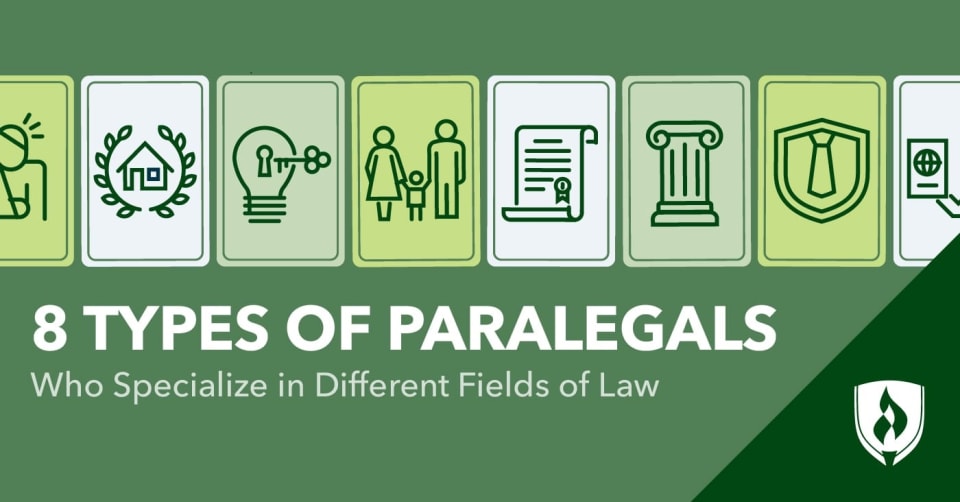
You’ve always been captivated by legal TV dramas, like Law and Order and Suits. Perhaps it’s time to consider building a career based on your interest in this fascinating field. The good news is you can launch a meaningful legal career without spending years in law school.
For many, becoming a paralegal is a much more manageable way to make a move into the legal field. The U.S. Bureau of Labor Statistics (BLS) projects employment of paralegals to grow by 10 percent, which is more than double the national average growth rate.1 This optimistic outlook, paired with the relatively short educational path, could make it the perfect balance you’re seeking.
Keep reading to learn more about the general duties and the different types of paralegals working in the legal field.
But first, what do paralegals do?
Before diving deeper into the different fields of law, it’s important to understand the basic role of a paralegal and the responsibilities they have. Generally speaking, a paralegal’s job is to assist lawyers with the day-to-day duties that keep a practice running smoothly.
This includes gathering and organizing evidence for investigations and trials, conducting research to help support a case, and preparing notes or summaries of transcripts and evidence to ensure a lawyer is prepared for trial. Paralegals also interact with clients and witnesses to schedule or conduct meetings and interviews. Additionally, they assist with drafting contracts and filing legal documents and other records.
The role of a paralegal requires you to be extremely organized, have a keen eye for detail and possess the ability to multitask effectively. Many duties also involve the use of technology, so being digitally savvy will serve you well. Lastly, it’s important to always be learning and keeping up with new laws and regulations.
8 Law specialties for paralegals to consider
While all paralegals play a similar role in the legal system, the daily duties and work environments can vary greatly. There are several different fields of law, which means there are also different types of paralegals to support these specialties.
Let us introduce you to eight different types of paralegals to get you thinking about where you might feel called to build your career. Browse this list to see which law specialties align most with your skills and interests.
1. Corporate paralegal
Corporate paralegals work for an entire organization rather than a single client at a time. Paralegals working in this specialty review contracts, research regulations and look for business impropriety. Corporate paralegals ensure businesses stay on their feet and don’t break federal laws, state laws or other important rules.
One of the most notable differences about these types of paralegals is that they rarely interact with clients, courts or the public. This individual typically executes their work behind the scenes.
Excellent research skills and an eye for detail are both skills that a corporate paralegal must possess, so if you have those under your belt and enjoy working for the greater good of a large group of people, this may be the law specialty for you.
2. Estate planning and probate paralegal
Are you comfortable working with people who are grieving or experiencing other types of delicate situations? Are you also great with details and numbers? If this describes you, pursuing an estate planning and probate paralegal position might be the path for you.
The legal process can seem overwhelming to someone in their 70s or 80s or for those planning for their own passing. A compassionate paralegal who is willing to help them along in the complicated process can make all the difference.
These types of paralegals assist in writing wills, planning estates, distributing property and working with probate pleadings and deeds. This position also requires a lot of administrative duties, such as helping clients manage inheritance taxes and recording deeds. So if you’re equally comfortable working with people and paperwork, an estate planning and probate paralegal job is worth considering.
3. Family law paralegal
Family law paralegals help attorneys represent individuals in a custody dispute. They often prepare pleadings, keep files organized, send files to opposing counsel and draft correspondence to clients, attorneys and the court.
Much of their time is spent corresponding with clients and keeping them up to date with their particular cases. Clients are often emotionally distraught due to family circumstances, so empathy is a quality that will serve you well in this position. It will likely require a healthy dose of patience as well because many custody battles can be messy and drawn out. If these are qualities you possess, a family-law specialty may be your calling.
4. Government paralegal
Government paralegals perform many of the same types of duties of a typical paralegal, only their employer is a department of a federal, state or local government. The role may vary slightly depending on which government branch you work for. Some positions also require community outreach and legal aid assistance. These types of paralegals often assist deputy city attorneys or deputy public defenders.
As with any paralegal position, an extreme attention to detail and the ability to work under pressure are essential. If you have knowledge or experience in a certain sector of the government, it could serve you well in a government paralegal career.
5. Immigration paralegal
Paralegals working in immigration law generally work in either a law office or at a large corporation with an immigration lawyer. They work with immigrants to organize and file various kinds of legal documents, including visa applications and petitions regarding deportation or for political asylum.
Having the ability to speak more than one language fluently is a definite advantage as law firms representing immigrants often depend on bilingual employees. If you’re great at multitasking and communicating, and you’re looking for a fast-paced job, working as an immigration paralegal could be a great fit for you.
6. Intellectual property paralegal
Intellectual property (IP) paralegals work heavily with trademarks and patents. They can work in law offices, in government organizations or for large corporations. They specialize in cases involving trademark infringement, patent and copyright applications, and intellectual property matters.
Their primary responsibilities include corresponding with clients, organizing exhibits and researching emerging intellectual-property legislation. Many IP paralegals work directly with marketing firms to assist in creating trademarks and securing patents. Some also lead a team of other paralegals.
If you have experience or an interest in marketing or you excel in managing people and projects, then you should consider pursuing this law specialty.
7. Litigation paralegal
Litigation is the process of legal action, so this type of paralegal works in the realm of law where any type of legal action is being taken. There is a wide variety of subspecialties within the litigation arena, and some popular ones are bankruptcy, personal injury, or corporate or intellectual property. Often, this type of paralegal will work with a client who is suing someone, so the work environment can be stressful and fast paced.
Preparing for trial, overseeing discovery and interviewing witnesses are all tasks a litigation paralegal typically executes. They might spend quite a bit of time in a courtroom as well. When a major business goes bankrupt and the media gets ahold of the story, litigation paralegals assist litigation lawyers in helping control the public perception of the case and finding the evidence needed to defeat the opposing party in court.
If you crave the dramatic, high-stakes environment depicted in your favorite legal TV shows and movies, becoming a litigation paralegal might be your best bet. Just be sure you have the energy and stamina to keep up with the demands.
8. Real estate paralegal
A paralegal specializing in real estate law helps clients wade through the paperwork necessary for making real estate purchases. They review and file documents, coordinate schedules and deadlines, and maintain correspondence between all parties involved in the transaction.
If a case goes to court over a zoning dispute, boundary issue or foreclosure, for example, a real estate paralegal works with clients to ensure they understand their options and their intentions are met. If you currently hold a real estate agent license, you’re already a step ahead of the competition.
Find your fit in the legal field
You’re now well aware of the many types of paralegals who support different fields of law. Once you acquire the proper training and education, you can choose which law specialty best fits your personality and career goals.
Now that you know you have plenty of options, you’re ready to take the next step in learning more about what the profession is really like. Get the inside scoop from seasoned experts in our article “What I Wish I Knew BEFORE Becoming a Paralegal.”
1Bureau of Labor Statistics, U.S. Department of Labor, Occupational Outlook Handbook, [accessed March, 2021] www.bls.gov/ooh/. Information represents national, averaged data for the occupations listed and includes workers at all levels of education and experience. This data does not represent starting salaries. Employment conditions in your area may vary.
EDITOR’S NOTE: This article was originally published in May 2014. It has since been updated to include information relevant to 2021.




